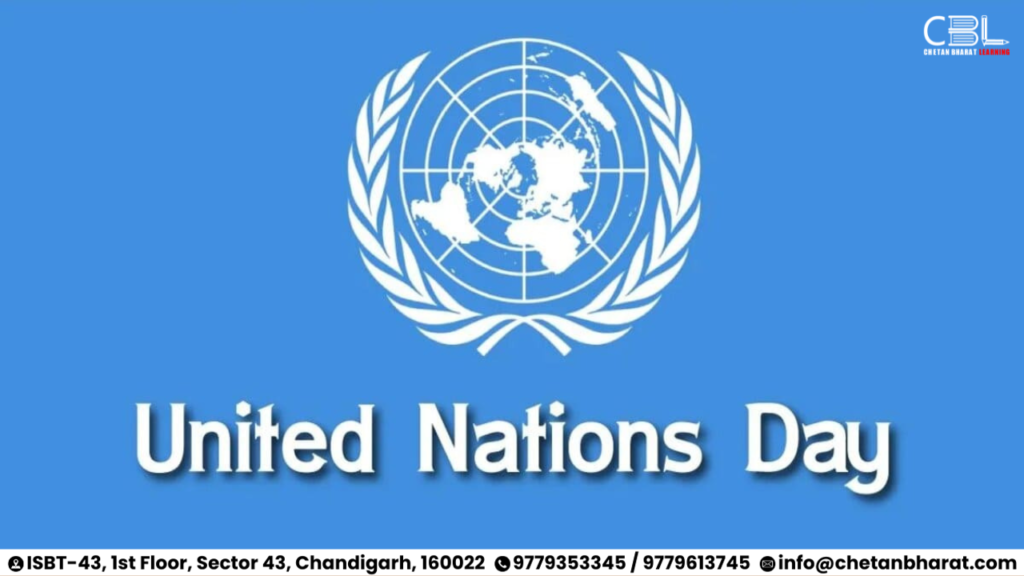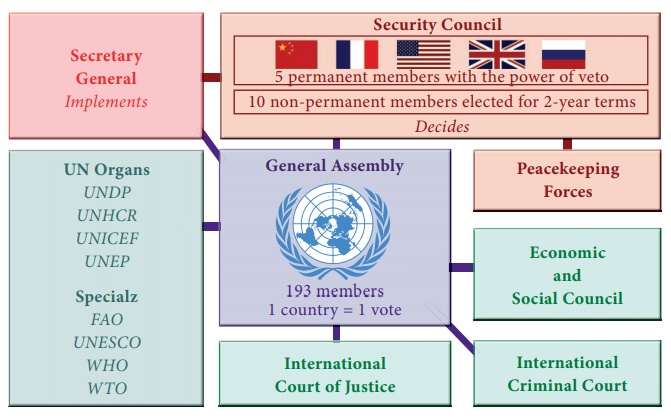
Important for UPSC, State PCS
Prelims: United Nation Day . World War II . Security Council . UN Charter
Mains: General Studies Paper 2- Challenges Related to the UN and Proposals to Reform the UN . UN’s Contribution to the World .
Context-
United Nations Day is celebrated on October 24, every year, to mark the establishment of the United Nation ( UN ) in 1945. It also highlights the importance of international cooperation. This day serves as a reminder of the UN’s mission to promote peace, security, human rights, and development across the globe.
About United Nations Day
- The day marks the anniversary of the United Nations Charter coming into force in 1945.
- The UN was established post-World War II to promote peace, security, and cooperation among countries.
- The term “United Nations” was first coined by Franklin D. Roosevelt in the Declaration of the United Nations on January 1, 1942.
- The organization started with 51 member states and has grown to 193.
- There are six official languages of the United Nation are as follows:
- Arabic
- Chinese
- English
- French
- Russian
- Spanish
- Member States make payments in accordance with an established scale of assessments. This scale is determined by the population size, national revenue, and ability of a country to pay.
- The top four contributors are the United States, Japan, China and Germany
- Significance: The UN focuses on maintaining international peace and security, providing humanitarian assistance, protecting human rights, and upholding international law.
- It has been a key player in international cooperation, peace, and development for over 75 years.
United Nations Organs–

United Nations Specialised Agencies
The UN specialized agencies are autonomous organizations working with the UN to address specific global issues. Here is the list of 15 key specialized agencies:
| United Nations Specialized agencies and their Headquarters | |||
| Specialized Agency | Area of Work | Established | Headquarters |
| Food and Agriculture Organization (FAO) | International efforts to defeat hunger | 1945 | Rome, Italy |
| International Labour Organization (ILO) | Promoting social justice and internationally recognized human and labour rights | 1919 | Geneva, Switzerland |
| International Civil Aviation Organization (ICAO) | Management of international air transport | 1944 | Montreal, Canada |
| International Maritime Organization (IMO) | Maritime safety and environmental performance of shipping | 1948 | London, UK |
| International Monetary Fund (IMF) | Global monetary cooperation, financial stability, and trade | 1944 | Washington, D.C., USA |
| International Telecommunication Union (ITU) | Coordination of global telecom networks and services | 1865 | Geneva, Switzerland |
| United Nations Educational, Scientific and Cultural Organization (UNESCO) | Promoting education, science, and cultural cooperation | 1945 | Paris, France |
| United Nations Industrial Development Organization (UNIDO) | Promotes industrial development for poverty reduction | 1966 | Vienna, Austria |
| World Health Organization (WHO) | Global public health | 1948 | Geneva, Switzerland |
| World Intellectual Property Organization (WIPO) | Protection of intellectual property worldwide | 1967 | Geneva, Switzerland |
| World Meteorological Organization (WMO) | World cooperation on weather, climate, and water resources | 1950 | Geneva, Switzerland |
| World Tourism Organization (UNWTO) | Promotion of responsible, sustainable, and universally accessible tourism | 1974 | Madrid, Spain |
| International Fund for Agricultural Development (IFAD) | Investing in rural populations to eliminate poverty | 1977 | Rome, Italy |
| Universal Postal Union (UPU) | Coordination of international postal policies | 1874 | Bern, Switzerland |
| World Bank Group (WBG) | Providing financial and technical assistance to developing countries | 1944 | Washington, D.C., USA |
United Nations Contribution to the World
- Preventing Nuclear Proliferation: International Atomic Energy Agency (IAEA) was established in 1957 as an autonomous organization within the United Nations system.
- It has been the world’s nuclear inspector for more than 50 years. IAEA makes sure that nuclear material under safeguards is solely used for peaceful purposes. More than 180 States currently have safeguards agreements with the Agency.
- Maintaining Peace and Security: Over the past 60 years, the United Nations has been able to restore quiet, enabling many countries to recover from violence by dispatching peacekeeping and observer teams to the world’s troubled regions.
- Supporting Disarmament: UN support the disarmament efforts through –
- The Chemical Weapons Convention-1997 The Mine-Ban Convention-1997, The Arms Trade Treaty-2014.
- UN peacekeepers forces to implement disarmament agreements between warring parties.
- Promoting Development: The Millennium Development Goals (MDG) have served as a framework for raising living standards, human capabilities, and potential worldwide since 2000.
- The UN Children’s Fund (UNICEF) works in more than 150 countries, focusing primarily on child protection, immunization, girls’ education, and emergency aid.
- The UN Development Programme (UNDP) supports more than 4,800 projects to combat poverty, encourage good governance, deal with crises, and protect the environment.
- Economic Development: UN Conference on Trade and Development (UNCTAD), an organization of the United Nations, assists developing nations in maximizing their trade possibilities.
- The World Bank has funded more than 12,000 projects in more than 170 countries since 1947 and lends and gives money to developing nations.
- Global Think Tank: The UN Statistics Division is the centre of the global statistical system, gathering and disseminating data on global economic, demographic, social, gender, environment, and energy trends.
- The UN Population Division is a foremost source of information and research on global population trends, producing up-to-date projections and demographic estimates.
- Historic Architecture and Natural Sites Protection: UNESCO has assisted 137 nations in protecting historic, cultural, and natural sites.
- In order to protect cultural assets, cultural diversity, and exceptional natural and cultural places, it has negotiated international accords.
- More than a thousand of these locations have been named World Heritage Sites due to their remarkable universal importance.
- Environment Protection: Climate change is a global problem that demands a global solution. The Intergovernmental Panel on Climate Change (IPCC), which brings together 2,000 leading climate change scientists, issues comprehensive scientific assessments every 5-6 years.
- Initiative on Human Rights: UN General Assembly adopted the Universal Declaration of Human Rights in 1948.
- It has helped to enact dozens of legally binding agreements on political, civil, economic, social and cultural rights.
- UN human rights bodies have focused world attention on cases of torture, disappearance, arbitrary detention and other violations.
What is India’s Role in the United Nations ?
India also recognizes and aware the people of the objective of United Nations goals and its achievements on United Nations Day.
India played a significant role in the formation of the United Nations (UN) and its subsequent activities. As one of the original members of the League of Nations, India gained automatic entry to the UN due to its participation in the Treaty of Versailles in 1919.
In 1944, India, along with other original UN members, signed the Declaration by the United Nations in Washington D.C. This declaration laid the foundation for the establishment of the UN and United Nations Day. The United Nations Charter, which was signed by 50 countries in 1945, formalized the UN’s existence.
India actively raised concerns about issues such as colonialism, apartheid, and racial discrimination as early as 1946.
In fact, India was the first country to bring the issue of apartheid and discriminatory treatment of Indians in South Africa to the attention of the UN.
India also played a vital role in the drafting of the Universal Declaration of Human Rights in 1948.
However, India’s experience with the UN has not always been positive. In the case of the Kashmir issue, India’s faith in the UN and its adherence to its principles proved costly, as the organization appeared to be influenced by pro-Pakistani powers.
What are the Proposals to Reform the United Nations-
- Expanding Permanent Membership & Inclusive Representation:
- Expanding the number of permanent members beyond the P5 and addressing the veto power could result in a more representative and democratic Security Council.
- It would potentially give more countries, especially from underrepresented regions like Africa a voice in decision-making.
- Reducing Inefficiencies in Administrative Processes:
- Streamlining the UN’s administrative procedures and reducing bureaucratic complexities can significantly improve its efficiency.
- India’s Role in UN Reform:
- India has consistently demonstrated its commitment to global peace, security, and development through its participation in UN peacekeeping missions, humanitarian assistance programs, and contributions to various UN agencies.
- India seeks a permanent seat on the Security Council, emphasising that such a step would make the Council more representative and responsive to the needs of the 21st century.
Practice Questions for Prelims
Which of the following best describes India’s stance on the UN Security Council reform ?
a) India opposes any changes to the current structure.
b) India advocates for permanent membership and a more representative body.
c) India prefers a larger rotating membership.
d) India believes in dissolving the Security Council entirely.
Answer: b) India advocates for permanent membership and a more representative body.
CBL Mains Practice Question
Examine the effectiveness of the United Nations Security Council in maintaining international peace and security. Do you think the veto power held by the permanent members is justified ? Why or why not ?




Leave a Reply
You must be logged in to post a comment.